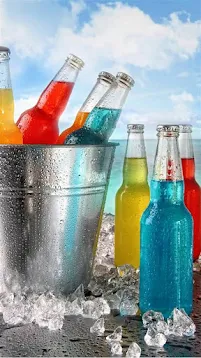Cold Drinks and Their Effects
"Refreshing and tempting, cold drinks offer a temporary escape from the heat, but it's essential to remember that their effects on our health run deeper than their cool allure."
Cold drinks have become an integral part of modern life. Whether you're sipping on a soda, an iced tea, or a fruit-flavored beverage, these cold and refreshing options are immensely popular. In this article, we'll explore the various facets of cold drinks, their impact on health, and alternatives to consider.
What Are Cold Drinks?
Cold drinks, also known as soft drinks or sodas, encompass a wide range of beverages. They are typically carbonated, sweetened, and served chilled. These drinks come in various flavors and are widely available in stores and restaurants. Some of the most common types include colas, lemon-lime sodas, fruit-flavored drinks, and iced teas.
The Impact on Health
The consumption of cold drinks can have significant effects on one's health. One of the most concerning aspects is their high sugar content. Many cold drinks are loaded with sugar, which can contribute to weight gain and obesity if consumed in excess. The excessive intake of sugar can also lead to various health issues, including diabetes and heart disease.
Dental Health
In addition to the negative impact on overall health, cold drinks can harm dental health. The high sugar and acid content in these beverages can erode tooth enamel, leading to cavities and tooth sensitivity. It's essential to be mindful of your dental health while enjoying cold drinks and practice good oral hygiene.
Nutritional Value
Cold drinks are often criticized for their lack of nutritional value. They provide little to no essential nutrients and are considered "empty calories." These drinks can displace healthier beverage choices that provide vital vitamins and minerals.
Artificial Ingredients
Many cold drinks contain artificial flavors, colors, and additives. These synthetic ingredients can have adverse effects on health, including allergies and sensitivities. Opting for drinks with natural ingredients can be a healthier choice.
Effects on Body Temperature
Cold drinks are known for their cooling sensation, which can be particularly enjoyable in hot weather. However, this sudden temperature drop can disrupt the body's equilibrium and may lead to digestive discomfort for some individuals.
Alternatives to Cold Drinks
While cold drinks are popular, there are healthier alternatives to consider. Water is the most natural and effective way to stay hydrated without the downsides of sugar and additives. Homemade iced teas and infused water can also provide a refreshing and healthy choice.
Moderation Is Key
It's essential to consume cold drinks in moderation. The American Heart Association recommends limiting added sugar intake, including that from cold drinks, to a reasonable daily amount. Being mindful of portion sizes and frequency is crucial for maintaining overall health.
Effects on Digestion
Cold drinks, especially when consumed with meals, can slow down the digestive process. This may lead to discomfort and indigestion. It's advisable to choose room temperature or warm beverages during meals to support proper digestion.
Hydration and Cold Drinks
Contrary to popular belief, cold drinks may not be the best choice for staying hydrated. Water remains the ideal option for quenching your thirst, as it is absorbed more quickly by the body and doesn't have the diuretic effect that some cold drinks do.
Cold Drinks and Children
Children are particularly vulnerable to the adverse effects of cold drinks due to their smaller size and developing bodies. Parents should monitor their children's intake and encourage healthier beverage options, such as water and milk.
Psychological Impact
The psychology behind the craving for cold drinks is intriguing. These drinks are often associated with pleasure and relaxation. Understanding the emotional attachment to them can help individuals make better choices and seek alternative ways to de-stress.
Cold Drinks and Sports
In the world of sports and athletics, cold drinks are frequently consumed to provide a quick energy boost. Athletes should be cautious about the sugar and caffeine content in these beverages and consider healthier alternatives to support their performance.
Conclusion
In conclusion, cold drinks have a significant presence in our lives, but they come with health-related concerns. It's crucial to be aware of the potential effects on health, dental well-being, and digestion. While moderation is key, exploring alternatives and staying hydrated with healthier options can lead to a more balanced and wholesome lifestyle.
5 Unique FAQs
1. Are diet sodas a healthier alternative to regular cold drinks?
Diet sodas contain artificial sweeteners instead of sugar, but they come with their own set of concerns. While they have fewer calories, some studies suggest potential health risks associated with artificial sweeteners.
2. Can I enjoy an occasional cold drink without harming my health?
Moderation is key. An occasional cold drink is unlikely to cause harm, but regular and excessive consumption can have negative health effects over time.
3. What are some natural ways to flavor water and make it more exciting?
You can infuse water with fresh fruits like citrus slices, berries, or herbs like mint. This adds natural flavor and a refreshing twist to your hydration routine.
4. Are there cold drinks that are healthier options?
Some cold drinks, such as unsweetened iced tea or sparkling water, can be healthier alternatives to traditional sodas, as they have little to no added sugars.
5. How can I reduce my cravings for cold drinks?
To reduce cravings, try staying hydrated with water, enjoying natural fruit juices in moderation, and finding alternative ways to relax and unwind that don't involve sugary drinks.




Comments
Post a Comment